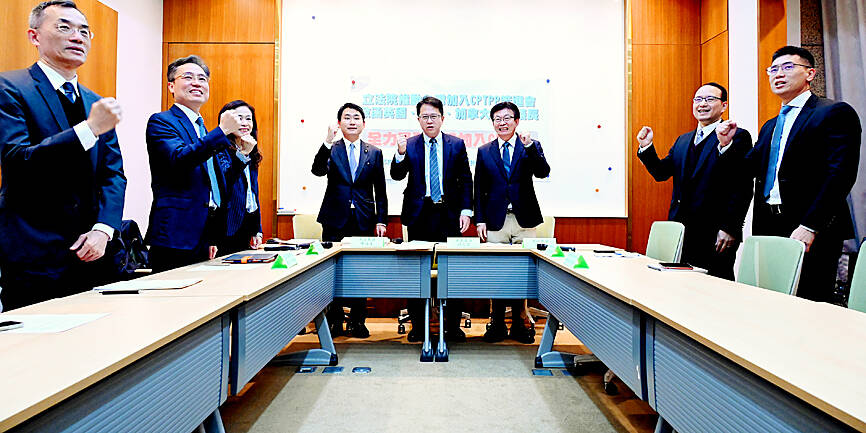Democratic Progressive Party legislators yesterday said they sent letters to parliamentary leaders in the UK, New Zealand, Canada and Australia calling for Taiwan’s inclusion in the Comprehensive and Progressive Agreement for Trans-Pacific Partnership (CPTPP).
The lawmakers at a news conference exhibited the open letters from the Legislative Yuan’s CPTPP for Taiwan Committee showing that “Taiwan is ready to join the CPTPP.”
Committee chair Legislator Chiu Chih-wei (邱志偉) said that joining the CPTPP would have great economic and strategic significance.

Photo: Chu Pei-hsiung, Taipei Times
If Taiwan were a part of the agreement, it could keep the regional supply chain going and safeguard regional economic security in the case of another chip shortage, such as during the COVID-19 pandemic, he said.
The legislature would continue to engage in parliamentary outreach and work with the Ministry of Economic Affairs and the Ministry of Foreign Affairs (MOFA) to persuade the 11 CPTPP founding members that Taiwan meets the criteria for membership, Chiu said.
Taiwan has an excellent opportunity to petition to join, with the chairs of the CPTPP from last year to next year being like-minded countries, MOFA Department of International Cooperation and Economic Affairs Director-General Vivian Lien (連玉蘋) said.
If the CPTPP adopts a first-come, first-serve principle, China’s application would be reviewed first, at which point China might attempt to drag out the process, Legislator Kuo Kuo-wen (郭國文) said.
However, if the group first reviews more prepared countries, China’s position in the line would fall drastically, leaving Taiwan and other applicants ahead, Kuo added.
Separately yesterday, President Tsai Ing-wen (蔡英文) reiterated calls for Taiwan to join the CPTPP, adding that the nation is prepared to be a part of a safer and more resilient supply chain alongside Japan and other regional countries.
Tsai was speaking at the opening of an annual Taiwan-Japan economic conference organized by the East Asia Economic Association.
Tsai said her pledge at the 2015 conference to increase Taiwan-Japan collaboration had been realized with Taiwan Semiconductor Manufacturing Co’s establishment of a plant in Kumamoto Prefecture, and Japanese semiconductor equipment manufacturers collaborating with Taiwanese counterparts.
Taiwan-Japan bilateral trade exceeded US$75 billion, up nearly 26 percent from 2016, while mutual investment has exceeded US$38.6 billion, up by 41 percent, Tsai said.
Taiwan and Japan collaboration would not only focus on semiconductor supply chains, but could also involve artificial intelligence, digital services and efforts to transition to renewable energy.
Taiwan and Japan are intertwined culturally and economically and are both proponents of democracy, she said, adding that the two were neighbors with very close ties, and she hoped that Taiwan and Japan would continue to see another half-century of friendly relations.

Taiwan is stepping up plans to create self-sufficient supply chains for combat drones and increase foreign orders from the US to counter China’s numerical superiority, a defense official said on Saturday. Commenting on condition of anonymity, the official said the nation’s armed forces are in agreement with US Admiral Samuel Paparo’s assessment that Taiwan’s military must be prepared to turn the nation’s waters into a “hellscape” for the Chinese People’s Liberation Army (PLA). Paparo, the commander of the US Indo-Pacific Command, reiterated the concept during a Congressional hearing in Washington on Wednesday. He first coined the term in a security conference last

Prosecutors today declined to say who was questioned regarding alleged forgery on petitions to recall Democratic Progressive Party (DPP) legislators, after Chinese-language media earlier reported that members of the Chinese Nationalist Party (KMT) Youth League were brought in for questioning. The Ministry of Justice Investigation Bureau confirmed that two people had been questioned, but did not disclose any further information about the ongoing investigation. KMT Youth League members Lee Hsiao-liang (李孝亮) and Liu Szu-yin (劉思吟) — who are leading the effort to recall DPP caucus chief executive Rosalia Wu (吳思瑤) and Legislator Wu Pei-yi (吳沛憶) — both posted on Facebook saying: “I

Sung Chien-liang (宋建樑), who led efforts to recall Democratic Progressive Party (DPP) Legislator Lee Kun-cheng (李坤城), was released on bail of NT$80,000 today amid outcry over his decision to wear a Nazi armband to questioning the night before. Sung arrived at the New Taipei District Prosecutors’ Office for questioning in a recall petition forgery case last night wearing a red armband bearing a swastika, carrying a copy of Adolf Hitler’s Mein Kampf and giving a Nazi salute. Sung left the building at 1:15am without the armband and covering the book with his coat. Lee said today that this is a serious

A mountain blaze that broke out yesterday morning in Yangmingshan National Park was put out after five hours, following multi agency efforts involving dozens of fire trucks and helicopter water drops. The fire might have been sparked by an air quality sensor operated by the National Center for High-Performance Computing, one of the national-level laboratories under the National Applied Research Laboratories, Yangmingshan National Park Headquarters said. The Taipei City Fire Department said the fire, which broke out at about 11am yesterday near the mountainous Xiaoyoukeng (小油坑) Recreation Area was extinguished at 4:32pm. It had initially dispatched 72 personnel in four command vehicles, 16